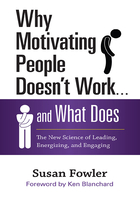
Why do we say that people are already motivated?
Assuming that people lack motivation at any time is a mistake! For example, when you lead a team meeting, it's a mistake to assume that participants are unmotivated if they are checking their text messages or tweeting instead of paying attention to you. They may just not be motivated to be at the meeting for the same reasons you are. They have appraised the situation, come to their own conclusions, and gone in their own motivational direction.
To experience this appraisal process for yourself, think about a recent meeting you attended. Reflect on your different thoughts and emotions as you noticed the meeting on your calendar, jumped off a call, and rushed to make the meeting on time. Did your feelings, opinions, or attitudes fluctuate from the time you added the meeting to your schedule to the time you left the meeting burdened with all the “next steps” on your to-do list?
This reflection process is what your people are doing all the time—either consciously or subconsciously. They are appraising their work experience and coming to conclusions that result in their intentions to act—either positively or negatively.
The appraisal process in figure 1.1 captures what you might have experienced in the example of attending the meeting. Whether mindful of it or not, you had thoughts and feelings about attending the meeting—you had both cognitive and emotional responses to the meeting. Is the meeting a safe or threatening event? Am I feeling supported or threatened? Is it a good use of or a waste of my time? Am I excited or fearful? Am I attending because I want to or because I feel I have to? Ultimately, how you feel about the meeting has the greatest influence on your sense of well-being. Your well-being determines your intentions, which ultimately lead to your behavior.
Whether mindful of it or not, you had thoughts and feelings about attending the meeting—you had both cognitive and emotional responses to the meeting. Is the meeting a safe or threatening event? Am I feeling supported or threatened? Is it a good use of or a waste of my time? Am I excited or fearful? Am I attending because I want to or because I feel I have to? Ultimately, how you feel about the meeting has the greatest influence on your sense of well-being. Your well-being determines your intentions, which ultimately lead to your behavior.
Every day, your employees' appraisal of their workplace leaves them with or without a positive sense of well-being. Their well-being determines their intentions, and intentions are the greatest predictors of behavior. A positive appraisal that results in a positive sense of well-being leads to positive intentions and behaviors that generate employee engagement.
A positive appraisal that results in a positive sense of well-being leads to positive intentions and behaviors that generate employee engagement.
